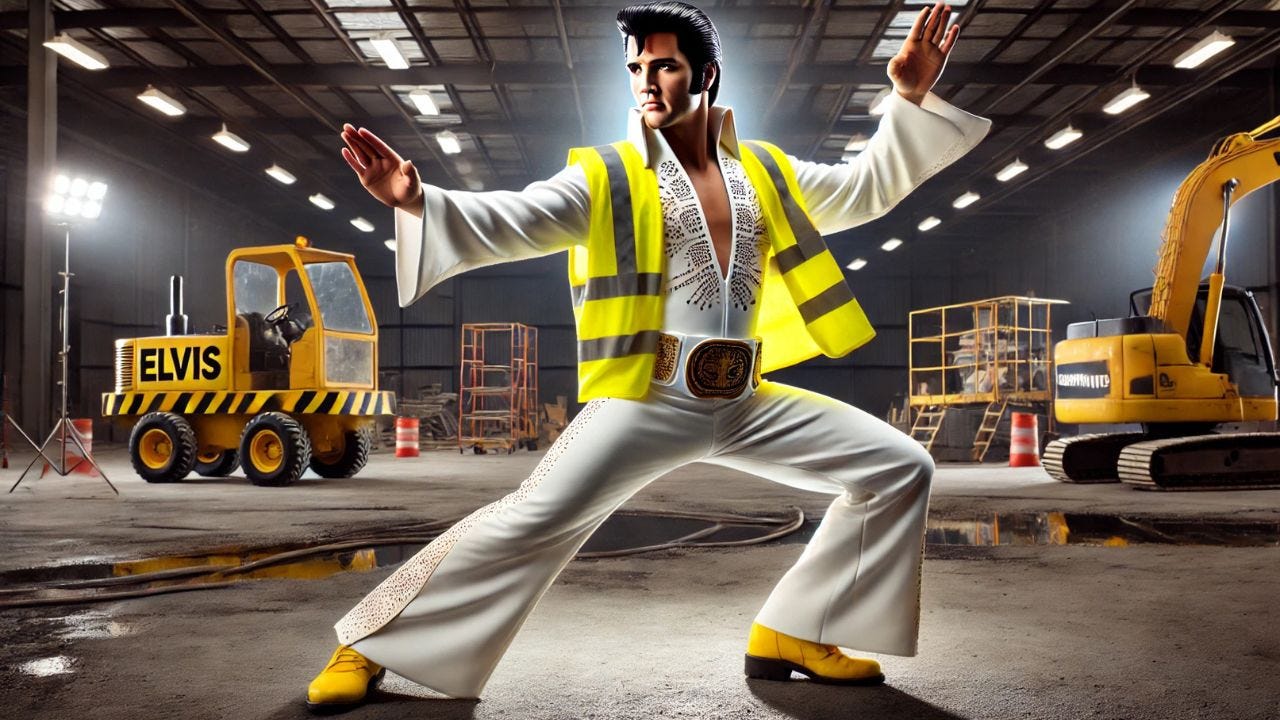Where's our Elvis?
Music, fashion, technology, politics and society are regularly revived and reinvented and make huge shifts in direction. It's surely about time demolition and construction had the same.
If you looked down the musical hit parade for 1955, it was comprised of bland, middle-of-the-road singers like Perry Como, Bing Crosby, Pat Boone, and Doris Day. But then 1956 arrived, and with it a young man by the name of Elvis Presley.
Within the space of just a few, short months, he became a phenomenon. During the year he burst onto the music scene, he had six of the best-selling songs of the year, including: Heartbreak Hotel; Don’t be Cruel; and Hound Dog.
Rock and Roll had arrived; and one man had turned the world of music and entertainment on its head. Thanks to Elvis, the world was "All shook up".
In a different yet very similar way, history repeated in the UK in 1976. The music charts, yet again, were bland with prog rock bands like Yes and Genesis pumping out concept albums containing songs that lasted for an hour (they probably weren’t that long - They just felt like it). Suddenly, like Elvis had done 20 years before, The Clash, The Damned, and The Sex Pistols arrived to shake up the music scene once again.
You might argue that The Beatles, Jimi Hendrix and the first round of hip-hop artists did a very similar thing.
Such revolutions are not confined to music. Think about the switch from radio to TV; the switch from black and white TV to colour; the arrival of the personal computer, the dawning of the Internet age, mobile telephones, smart phones, tablet computers. Factories switched from manual labour to robotic labour. We saw the fall of the Berlin Wall and the dissolution of the Soviet Union. As a nation, we surrendered fossil fuels; we cast ourselves adrift from our European Union neighbours; and we saw same-sex marriages move into the mainstream.
In each instance, these marked a paradigm shift; a new direction for humanity, society, business and individual people.
So where is our paradigm shift in the demolition and construction industry? Where is our shake-up? Where’s our Elvis?
You might argue that the arrival of machines like the JCB MK1 and the dawning the age of mechanisation marked a major shake-up. But that JCB machine landed at roughly the same time as Elvis first swivelled his hips. Since then?
Oh sure, there have been variations on the theme. We have seen excavators, wheel loaders, dozers, graders, and skid steer loaders pitch up; and we have seen all of these develop over the years. But that is EVOLUTION. Surely we are long overdue a REVOLUTION?
It’s not as if we haven’t had opportunities.
We had the partial collapse of the Ronan Point tower block in Canning Town in London back in 1968. We had the partial collapse of the Didcot A Power Station boiler house in 2016. We had the Grenfell Tower disaster in 2017.
It is 31 years since the Latham Report, 27 years since the Egan Report, and 15 years since the publication of the Wolstenholme Report. And it’s now more than five years since the UK construction sector was granted key worker status when the COVID-19 pandemic took hold.
Any and all of these had the potential to bring about that paradigm shift; that industry shake-up. But did they? Have you noticed a marked change or improvement in processes, procedures, working practices or working conditions?
Since Elvis checked in at the Heartbreak Hotel, we have had 18 UK prime ministers. We have seen governments, cabinets and ministers come and go. We have seen quangos created, campaigns unveiled. There have been training, health and safety initiatives. There have been crackdowns on - variously - working at height; slips, trip and falls; asbestos; silica dust; contaminated wood; and a whole plethora of other risks and hazards. But while the annual fatality stats have fallen gradually over the years, they seem to have bottomed out. Since the global pandemic, they have actually spiked again.
Now obviously, we are on the cusp of a significant shift, equipment-wise. The days of diesel are fast drawing to a close and, those of us that will be around when that switch happens, will be required to make a leap into an electric or hydrogen unknown. But not really. Because while the fuel used to power the equipment might be new, the equipment itself is pretty much the same as we have today, only with fewer moving parts and less black smoke. In real terms, this is not a shift at all. Diggers will still dig. Dozers will still doze. And haulers will still haul. This is less “vive la revolution” and more “vive l’evolution”
More than 70 years after the arrival of the first backhoe loader, 57 years after Ronan Point, 31 years after the Latham Report and almost 10 years after Didcot, nothing much has really changed. Surely we are due a shake-up?
So where’s our Elvis?





